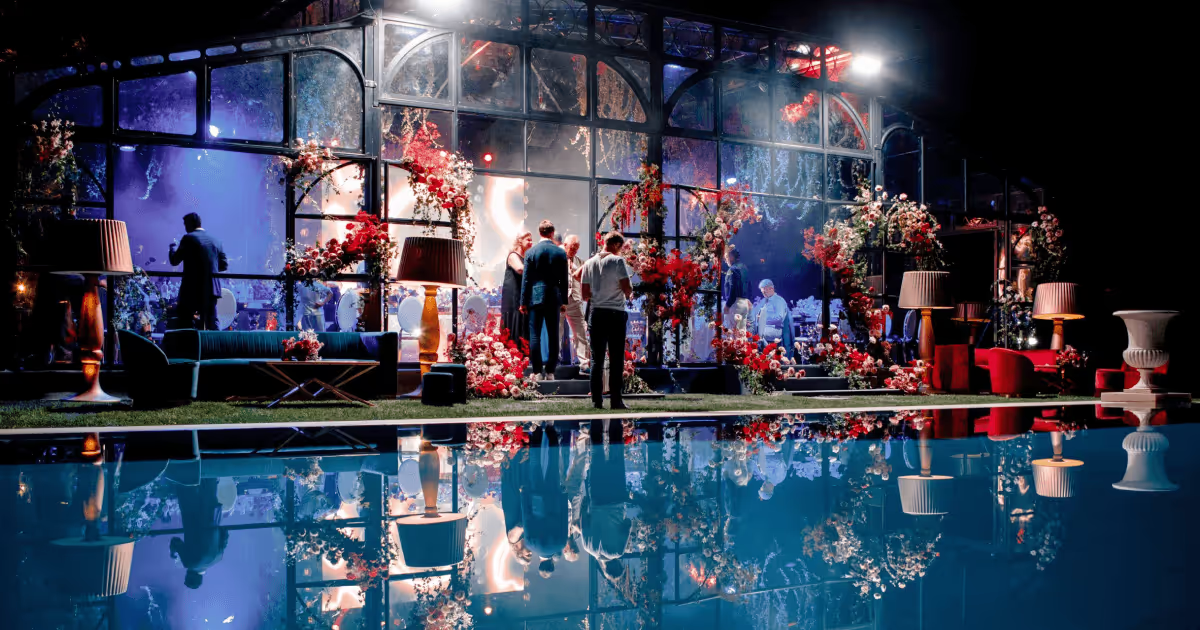How to start a party rental business in 10 steps + Free rental business plan template

If you are looking for tips on how to start a party rental business, then you're in the right place! 🎉
If there is one thing to learn from living through pandemics and lockdowns, it's that a lot can change in a year. As a software provider for party rental software businesses and live event suppliers, we've experienced firsthand the impact of Covid-19 on our industry.
While this has been a very dark moment for the industry, many companies used this time to work on their strategies and improve their business processes.
And, contrary to popular belief, starting a party rental business today could be one of those milestones that you'll look back on years from now as one of the best decisions you've ever made.
But if you want it to be successful, you're going to have to take the time to reflect and strategize on your future business.
To guide you through this, here are 10 steps you can follow on how to start a party rental business:
Types of Party Rental Businesses
Step 1: Study your market
Step 2: Write your business plan
Step 3: Register for business licenses, permits and taxes
Step 4: Purchase the right equipment
Step 5: Implement a pricing strategy
Step 6: Get insurance
Step 7: Keep track of your customers, orders, and due dates
Step 8: Invest in marketing
Step 9: Monitor your progress
Step 10: Grow your team
Things you should consider
Types of Party Rental Businesses
Ready to step into the world of party supplies? Before you dive head-first into the nitty-gritty of your next business success, it is important to determine your niche in the industry.
Let's explore 4 party rental business ideas ranging from low to high investment costs, but all with the potential for scalable growth!
1. Photo Booth Rental: Capture Memories
“Say cheese!”
Photo booth rentals bring a unique and interactive experience to all kinds of events and for guests of all ages. These kinds of party rental supplies are easily adaptable, making them a worthwhile investment for starters. Set up a photo booth with props and backdrops for festivals, weddings, and corporate events.
Note that there are many different types of photo booths, from selfie stations to 360-degree photo booths. If you decide to go cheap on your initial investment, this means your rental price will be on the lower side as well.
Initial investment: $1.500 - $10.000 (photo booth and props)
ROI:
Revenue per event: $700
Net profit per event: $600
You can also offer various packages including prints, digital copies, and customized photo booth experiences. Have a look at some of the options in the table below.
Keep in mind that idle time or an early setup time can cost you up to $75 per hour. So make sure you keep your photo booth as productive as possible!
Source: Fash.com
2. Chair Rental: Creating Style and Comfort
A chair rental service provides customers with chairs for specific events or occasions. These types of party and event rental services and companies offer chairs for a designated period, along with convenient delivery and pick-up services.
Whether it's an intimate gathering or a large-scale affair, your chair rental business can help create the perfect seating arrangement to accommodate guests in comfort and style.
Initial investment: $3.000 - $10.000 (for 100 chairs) and $180 per month for a storage unit
ROI:
Revenue per event: $200 (excl. delivery)
Net profit per event: $190
This business idea can easily be expanded, by facilitating the next concept of tent rentals:
3. Tent Rental: Transforming Spaces
From elegant tents with flowing fabric and delicate lighting to sturdy frame tents, your tent rental business can cater to diverse event needs.
With an emphasis on quality and aesthetics, you can offer a range of options that match different themes and budgets, ensuring that each event is unique and memorable.
Initial investment: $2.000 - $10.000 (depending on the size of the tent) and $180 per month for a storage unit
ROI:
Revenue per event: $750 per day for an event with 100 people
Net profit per event: $650 per day (costs include transport and installation)
The how to start an event rental business and price you can charge, really depends on the type and size of events you want to target. Let's explore a couple of different options.
Source: A Party center and Meadow Valey Party Rentals
4. Wedding Party Rental: Unforgettable Celebrations
Excited about all three? Why not combine them and start a wedding rental business!
Whether it's an intimate gathering or a grand extravaganza, wedding rental supply businesses play a crucial role in offering a comprehensive range of options to realize a dream wedding.
Let's explore some successful examples of wedding rental businesses that have left a mark on the industry:
- Ship Our Wedding: has shaken up the event rental scene with their cool DIY platform. They have a large supply of rental items you can easily ship to any kind of venue.
- Rustic Wedding Chic: has successfully chosen a specific niche in the wedding rental industry, by solely focusing on the rustic aesthetic.
- Rent my Wedding: as the very first online wedding rental, this business is focused on shipping lighting, draping, and photo booths.
Haven't found your niche yet? Here are 5 more creative ideas for a party rental business!
- Dance floors to rent
- Staging to rent
- Sound equipment to rent
- Cocktail bars to rent
- Inflatables to rent
Will you say ‘I do' to one of these ideas? Then head on over to the next section, where we dive into the 10 steps to start a party rental business.

Step 1: Study your market
When starting a party rental business, the first thing that you should do is study your market. This step is called market research.
Market research is the process of gathering information on your target audience and thorough market research done to understand their wants and needs.
Studying your market will provide you with insight into what methods work for your competitors, how they operate, and the services and prices they offer.
You can then use this information to determine how you should structure your product or services to bring an added value to your target market and find a competitive advantage for your party rental business.
Here are some questions that you can ask when conducting market research:
- Who are the current customers?
- What is their purchasing power?
- What types of products or services are they looking for?
- Where do these customers look for solutions?
- What are the current options available?
- What added value can you bring?
- What challenges do customers face?
- What are the challenges for the current market?
- How many people would be interested in your offer?
- What alternatives are currently available?
- What do potential customers pay for these alternatives?
- What influences purchases and conversions among your target audience?
Step 2: Write your business plan
After you've studied your market and identified business ideas, the next step in starting a party rental business is to start structuring your ideas in a solid business plan.
A business plan is a document that outlines your business's objectives, and the strategies that will be implemented to help you achieve them.
In your business plan, you should include:
- findings from your market research
- your target market
- your go-to-market strategy
- your starting capital
- financial projections
- your business purpose, and mission
Writing a business plan down is an essential part of starting a party rental business because it makes you consider and research important aspects of the profitable rental business that you may have ignored previously.
You should keep in mind that a good business plan is never completely done. As your business starts to grow, you will start making changes. It is always a good idea to review and update your business plan as things change or at least once a year to reflect on your goals for the upcoming year.
Updating your business plan will help you strategize, stay relevant in your market, and plan for what needs to be done to achieve your desired results.
Ready to take action and start your own party rental company? That's great, this is the spirit we're looking for! Feel free to use our very own free party rental business plan to get you started right away. Good luck!
Step 3: Register for business licenses, permits and taxes
When starting a business, you are expected to have the right licenses and permits for the country or state that you are operating in. Failure to do so can result in hefty fines, or even cause your business to be shut down.
Although there are generally no licenses required specifically for party rental businesses in most countries, business owners should check the local requirements of their country or state to be sure that they are in compliance with the laws and regulations that apply there.
If you are in the United States, you can apply for federal or state licenses and permits here.
It's also essential to have a clear understanding of the financial aspects, including tax obligations.
Registering for taxes is a crucial step for any business, ensuring compliance with legal requirements and avoiding potential penalties. To facilitate this, you will require an Employer Identification Number, which can be conveniently obtained through the IRS of your country, via their website, phone, or email.
US citizens can follow these steps:
- Decide in which states you want to conduct business.
- Look for the registration threshold for these states, to determine for which states your need to get a tax permit.
- Search for the taxing agencies in those states (usually called the State Department of Revenue).
- Follow the steps required by the taxing agency. Usually, this means you need to download the Sales and Use Tax Form from your state or fill it out online.
- It can take up to 4 weeks to receive your tax permits. Until that time, you are not allowed to collect rental sales tax from your customers.
Do not forget this crucial step before heading for success!

Step 4: Purchase the right equipment
When it comes to purchasing equipment for your party rental business, you should take the time to ask customers for the types of party rental equipment they tend to look for.
By doing so, you will start seeing trends emerge pointing toward popular items such as:
- folding tables
- folding chairs
- and party tents
But you will also see unique items such as:
- lighting systems
- photo booths
- bounce houses
- or food displays
Since purchasing equipment is likely to be one of your biggest investments, you want to make sure that you avoid idle inventory and that you don't overspend in the beginning. It is cheaper and easier to buy more equipment later than to get rid of excess unwanted equipment.
🔎 Idle inventory is having items in your inventory that are not being used and are not needed to generate profit.
Therefore, you should not purchase all of the equipment that they mention when you launch your company, instead, you should make a priority list of equipment you need to purchase and a list of equipment that can be subrented.
By having a combination of your own inventory and a list of equipment you can subrent, you will be able to fulfill more of a customer's needs in one sitting.
And if they can get all of the items they need from a single vendor instead of relying on three or four separate companies, that's the option they're most likely to take.
⚠️ When purchasing equipment, you should also consider investing in vehicles that can be used to transport and set up the equipment at the location of the events.
Step 5: Implement a pricing strategy
Based on your research in step 1 and 2, you will have information on:
- what your competitors are charging,
- what your potential customers are willing to pay,
- and how much you need to charge in order to break even or be profitable.
Pricing your services can be tough, but you can use the prices that your competitors charge as a reference.
However, you should keep in mind that if you set your prices too low, it will be harder for your company to break even, and it can make potential customers think twice about renting from you because they might think that there is a catch or that something might be wrong with your services.
And of course, if you set your prices too high, you will miss out on valuable sales.
There are dozens of pricing models and strategies that can help you better understand how to set the right prices for your audience and revenue goals.
Here are some pricing strategies examples that you can consider using:
- Cost-Plus Margin: A pricing method in which the selling price of a service is determined by adding a profit margin to the costs of the service.
- Demand-Based Pricing: With this pricing method, the increase and decrease in consumer demand determines the pricing.
- Competition-Based Pricing: Here, prices are determined by the prices set by your competition.
- Price Bundling: The pricing is set for a group of products and grouped products are not rented out separately.

Step 6: Get insurance
Just like business licenses and permits, you will need business insurance in order to operate safely and legally.
Running a party rental business means purchasing and renting both indoor and outdoor equipment, like lights, speakers, or tents. Since you've invested money into these equipment, and your company relies on them, you should insure them in case any accidents happen.
You also want to make sure that you are protected in the event that someone gets hurt or injured while using your equipment, this is usually covered with liability insurance though.
Liability insurance is mandatory for party rental businesses in some places and sometimes your business isn't legally allowed to operate without it. You should check your local laws to see if this applies to you.
It is strongly recommended to have liability insurance for your own safety, even if it isn't mandatory in your area. Many potential customers will also consider you more trustworthy if you present them with proof of that insurance.
You should consider consulting with an insurance broker to help you choose the best insurance policies for your party rental company, they will help you assess the risks involved in the industry itself, and tell you what are the best insurances you should choose.

Step 7: Keep track of your customers, orders, and due dates
Managing a party rental business requires having strong organizational skills. You are in an industry with strict deadlines and many moving parts, so it is essential that you keep track of your projects and resources accurately if you want to plan events successfully.
Whether you are planning weddings, parties, or corporate events, you can use a dedicated party rental management software like Rentman, to to manage inventory, online bookings, quotes, payments, and returns in a single platform.
Rentman will help you manage all of the steps involved in running a party rental business more efficiently, save you time in planning events and give your financial documents a more professional look.
With Rentman's built-in template editor, you customize your own templates with images, personal texts, and your corporate branding to make your quotes easily recognizable.
You can also connect Rentman to Mollie, Stripe, and WooCommerce to accept online payments, and showcase your products in a webshop.

Step 8: Invest in marketing
Starting a party rental business can be difficult, let alone learning how to market one. However, investing in marketing should be one of the first things you should consider doing when starting your successful party rental business.
Why? Marketing helps you build brand awareness and credibility, which is very important in the early stages of your business, as you want to make potential customers familiar with your business performance brand and convince them why they should choose you over your competitors.
As a result, marketing efforts will have an effect on your turnover, pricing, promotions, and your advertising strategies.
Here are some examples of marketing techniques that you can use to build brand awareness:
- networking with local businesses (event planners, event venues…)
- advertising your business in relevant business magazines, tv and radio stations
- social media advertising (Facebook ads, Youtube ads…)
- search engine advertising, by posting ads on Google and Bing result pages or other websites using CPC (cost per click)
- creating and managing your “Google My Business” listing

Step 9: Monitor your progress
When you track your progress, you naturally become more purposeful about the work you do.You also have more insight into the value that you're creating for your business so you can show your team the results of your efforts.
With Rentman, you can create a personal dashboard to monitor your progress and use your data to make better decisions:
- identify which equipment is the most profitable,
- what your next purchase should be,
- where you lose revenue,
- and much more…

Step 10: Grow your team
The final step is to grow your team. Hiring your first employees is a huge step when starting a party rental business. Having the extra manpower means that you can assign tasks to members of your team and dedicate your time to other tasks with a higher priority.
But before bringing just anyone on board, you need to understand that extra manpower entails a whole new string of legal obligations, liabilities, expenses, and, of course, paperwork.
The number of employees you decide to hire in the first stages of your business will depend on your needs. But, as your business grows, you will need at least a few employees to take and prepare orders, deliver and pick up equipment and deal with customer service.
Here are some examples of the types of employees you can recruit when starting a party rental business:
- delivery drivers
- crew members
- bookkeepers
- technicians
- sales/marketing specialists
The employees that you hire should have a few key qualities, this includes: flexibility, passion, and trustworthiness. It is important to hire people who are flexible enough to take on diverse responsibilities until you can expand further. And, since every employee plays a key role in your business, it is important to hire people you trust.
💡 Another option you have is to outsource some of these tasks to freelancers or independent contractors.
“No one can whistle a symphony. It takes a whole orchestra to play it.”
H.E. Luccock
Things you should consider
The party rental industry can be very seasonal, there are usually more events during holidays or when there is good weather.It is also a competitive industry. As a business owner, you'll need to be creative and stay up-to-date with current trends.
Finally, networking is an important factor in a party rental business' success. You'll need to create and maintain a good relationship with local event planners and event venues to bring in new business and explore new opportunities.
Start a free 30-day trial of Rentman today and start running your party rental business more efficiently!
Cover photo provided by Blunotte Eventi
Frequently asked questions
In a party rental business, you provide various resources to ensure that a party or a small-scale event goes successfully. This can go from renting out equipment such as tents, chairs or tables, all the way up to renting event venues and operating staff.
You can rent out anything you want, as long as you think it helps a party become successful. However, some of the most popular party rental business ideas are the following: photo booth rental, chair rental, tent rental and wedding party rental.
To start a party rental business, make sure to study your market, develop a business plan, as well as register for licenses and permits. The next steps are purchasing the right equipment, pricing them to ensure profits, as well as getting insurance for any potential damage. Lastly, you need to make sure you can easily track all your orders. Pro tip! Use a resource management platform like Rentman to have the best overview over your customers, orders and due dates.
Yes, you can start a party rental business as a side gig. If you start small and rent out equipment for various events (such as chairs, tables or tents), you can definitely do this in your spare time, as long as you make sure you work on a business plan and your equipment is priced accordingly for subrenting.
Starting a party rental business might not be as expensive as you might think. For example, purchasing chairs, tables or tents can cost you anything between $2.000 and $10.000, as well as storage monthly costs of up to $200.
It depends on the size of events and your inventory. However, to give some examples, chair rental businesses can have revenues of around $200 per event, whereas tent rental businesses can have revenues of up to $750 per day for an event.
Yes, party rental businesses can be really profitable, as long as you price your equipment accordingly for subrenting. For example, chair rental businesses can have profits of $190 per event and tent rental businesses can have profits of up to $650 per day for an event.
Always check trends before purchasing any equipment, for example using tools such as Google Trends. Since purchasing equipment will most likely be your biggest investment, you also need to make sure to avoid buying idle inventory, which is equipment that will not be used for all your events and that will not generate profit every time. With that said, the most common items you can purchase are folding tables, folding chairs, party tents and even photo booths or bounce houses.
Always price your equipment based on your business plan. With that said, make sure to find out what your competitors are charging, what your potential customers are willing to pay, as well as how much you need to charge in order to break even or be profitable while renting out your equipment (for example, for a lifespan of two years). Here are some pricing strategies: cost-plus margin, demand-based pricing, competition-based pricing and price bundling.
While starting a party rental business might seem easy, maintaining an overview over your processes requires strong organizational skills. While starting out, spreadsheets might be the easiest solution to keep track of everything. However, once more orders come in, you’ll definitely need a rental management tool, like Rentman. With Rentman you can manage all steps involved in running a party rental business in a more efficient way, saving you lots of time and giving you a better financial overview for your projects
Previous blog posts



